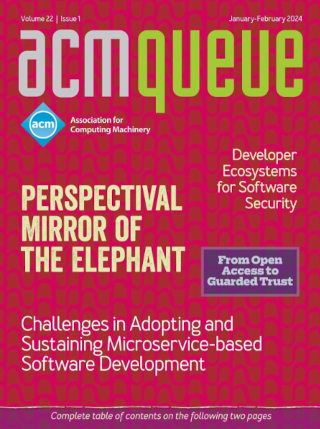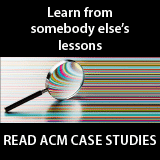Cluster-level Logging of Containers with Containers:
Logging Challenges of Container-Based Cloud Deployments
This article shows how cluster-level logging infrastructure can be implemented using open source tools and deployed using the very same abstractions that are used to compose and manage the software systems being logged. Collecting and analyzing log information is an essential aspect of running production systems to ensure their reliability and to provide important auditing information. Many tools have been developed to help with the aggregation and collection of logs for specific software components (e.g., an Apache web server) running on specific servers (e.g., Fluentd and Logstash.)
How OSGi Changed My Life:
The promises of the Lego hypothesis have yet to materialize fully, but they remain a goal worth pursuing.
In the early 1980s I discovered OOP (object-oriented programming) and fell in love with it, head over heels. As usual, this kind of love meant convincing management to invest in this new technology, and most important of all, send me to cool conferences. So I pitched the technology to my manager. I sketched him the rosy future, how one day we would create applications from ready-made classes. We would get those classes from a repository, put them together, and voila, a new application would be born. Today we take objects more or less for granted, but if I am honest, the pitch I gave to my manager in 1985 never really materialized.
ASPs: The Integration Challenge:
The promise of software as a service is becoming a reality with many ASPs.
Organizations using ASPs and third-party vendors that provide value-added products to ASPs need to integrate with them. ASPs enable this integration by providing Web service-based APIs. There are significant differences between integrating with ASPs over the Internet and integrating with a local application. When integrating with ASPs, users have to consider a number of issues, including latency, unavailability, upgrades, performance, load limiting, and lack of transaction support.
Untangling Enterprise Java:
A new breed of framework helps eliminate crosscutting concerns.
Separation of concerns is one of the oldest concepts in computer science. The term was coined by Dijkstra in 1974.1 It is important because it simplifies software, making it easier to develop and maintain. Separation of concerns is commonly achieved by decomposing an application into components. There are, however, crosscutting concerns, which span (or cut across) multiple components. These kinds of concerns cannot be handled by traditional forms of modularization and can make the application more complex and difficult to maintain.
The Rise and Fall of CORBA:
There’s a lot we can learn from CORBA’s mistakes.
Depending on exactly when one starts counting, CORBA is about 10-15 years old. During its lifetime, CORBA has moved from being a bleeding-edge technology for early adopters, to being a popular middleware, to being a niche technology that exists in relative obscurity. It is instructive to examine why CORBA—despite once being heralded as the “next-generation technology for e-commerce”—suffered this fate. CORBA’s history is one that the computing industry has seen many times, and it seems likely that current middleware efforts, specifically Web services, will reenact a similar history.
From COM to Common:
Component software’s 10-year journey toward ubiquity
Ten years ago, the term component software meant something relatively specific and concrete. A small number of software component frameworks more or less defined the concept for most people. Today, few terms in the software industry are less precise than component software. There are now many different forms of software componentry for many different purposes. The technologies and methodologies of 10 years ago have evolved in fundamental ways and have been joined by an explosion of new technologies and approaches that have redefined our previously held notions of component software.
A Conversation with Leo Chang of ClickShift:
In the world of component software, simplicity, not standards, might be the key.
To explore this month’s theme of component technologies, we brought together two engineers with lots of experience in the field to discuss some of the current trends and future direction in the world of software components. Queue Editorial board member Terry Coatta is the director of software development at GPS Industries. His expertise is in distributed component systems such as CORBA, EJB, and COM. He joins in the discussion with Leo Chang, the cofounder and CTO of ClickShift, an online campaign optimization and management company.
Leveraging Application Frameworks:
Why frameworks are important and how to apply them effectively
In today’s competitive, fast-paced computing industry, successful software must increasingly be: (1) extensible to support successions of quick updates and additions to address new requirements and take advantage of emerging markets; (2) flexible to support a growing range of multimedia data types, traffic flows, and end-to-end QoS (quality of service) requirements; (3) portable to reduce the effort required to support applications on heterogeneous operating-system platforms and compilers; (4) reliable to ensure that applications are robust and tolerant to faults; (5) scalable to enable applications to handle larger numbers of clients simultaneously; and (6) affordable to ensure that the total ownership costs of software acquisition and evolution are not prohibitively high.






